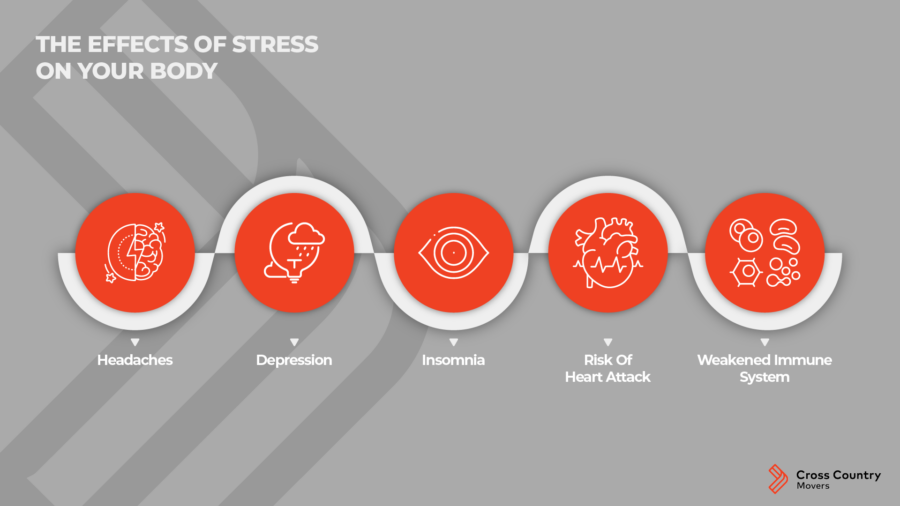

Say Goodbye to Moving Stress with These Stress-Busting Tips
Posted in Moving Tips & Tricks on June 26, 2023
Today, we invite you to leave your worries at the door as we embark on a journey to bid farewell to the relentless grip of moving stress. We all know that moving, despite its promises of new beginnings and fresh adventures, can often transform into a whirlwind of anxiety-inducing chaos. But fear not, for we have gathered a collection of stress-busting tips that will transform your moving experience into a tranquil and seamless affair.
Reduce the stress of moving by creating a relocation checklist to stay organized and focused throughout the process. Embrace the opportunity to declutter and donate items you no longer need, lightening your physical and mental load. Seek support from friends, family, or professional movers to share the tasks and alleviate the burden. Prioritize self-care by taking breaks, staying hydrated, and getting enough rest.
Why Is Moving So Stressful?
There are a few reasons why relocations can be overwhelming. First off, it’s the sheer magnitude of the undertaking. Packing up your entire life, saying goodbye to friends and familiar surroundings, and venturing into the unknown can feel overwhelming.
Then there’s the fear of the unknown – what if you don’t like your new neighborhood? What if your favorite coffee shop is miles away? The uncertainty can be anxiety-inducing. And let’s not forget about the logistical nightmare: coordinating movers, packing boxes, and hoping that nothing gets broken in transit. It’s enough to make even the most zen-like individuals break out in a cold sweat.
But relocating to another state alone or with family can also be a positive experience if approached with the right mindset and preparation. With a dash of optimism and a sprinkle of planning, you can turn this seemingly stressful endeavor into a grand adventure. Imagine the thrill of exploring a new neighborhood, discovering hidden gems, and making new friends.
The Importance of Managing Stress During a Move
Relocating to a new city is undoubtedly a stressful experience, but it’s crucial to prioritize stress management during this transitional period. Why, you may ask? Well, stress can have a sneaky way of creeping into every aspect of your life, affecting your physical and mental well-being. By taking proactive steps to manage stress during a move, you can ensure a smoother and more enjoyable journey.

Tip #1: Understand Your Moving Stress
Relocation stress is more than just physical tasks and logistical challenges. It often stems from the emotional attachment we have to our belongings and the sense of leaving behind familiar surroundings. It’s important to recognize and understand these underlying factors to effectively manage all tension.
Our belongings hold sentimental value and memories, making it difficult to part with them. Each item may trigger a wave of emotions, from nostalgia to anxiety about letting go of the past. Take the time to acknowledge these feelings and give yourself permission to experience them. It’s natural to feel a sense of loss or sadness during this transition.
The Physical and Emotional Symptoms of Moving Stress
Relocation stress can manifest itself in both physical and emotional ways, affecting our overall well-being during this transitional period. According to Healthline, it triggers a fight-or-flight response in our bodies. It’s essential to recognize and address these symptoms to take care of ourselves throughout the relocation process. Here are some common physical and emotional symptoms of relocation stress, listed in the table below.
| Physical Symptoms | Emotional Symptoms |
|---|---|
| Fatigue and exhaustion | Anxiety and worry |
| Headaches or migraines | Feelings of overwhelm |
| Muscle tension and soreness | Irritability and mood swings |
| Difficulty sleeping or insomnia | Sadness or a sense of loss |
| Increased susceptibility to illness | Difficulty concentrating |
| Digestive issues | Increased sensitivity to stressors |
Tip #2: Prepare for a Stress-Free Move
Is moving stressful? It can be quite an overwhelming experience, whether you’re relocating for a job in a new city or you’re uprooting your life for love. It’s not just about packing your belongings and transporting them to your new place – there are a lot of other things that you need to consider to make the process stress-free.
Create a Timeline and Checklist
One of the most useful ways to avoid stress during a move is to create a timeline and a checklist for relocation to another state. This will give you a clear idea of what you need to do and when you need to do it. Start by making a to-do list of all the tasks that need to be done.
Remember to include things like contacting the long-distance movers and asking for a quote on cross-country moving services, packing your belongings, arranging for the transfer of utility services, and changing addresses. Once you have a comprehensive list, start prioritizing these tasks and assign specific dates for each. This will not only help you stay organized but also ensure that you don’t miss any important deadlines.
Declutter and Downsize Belongings
Another important step in preparing for a stress-free move is decluttering and downsizing your belongings. Relocation can be an excellent opportunity to get rid of things you no longer need or use. Start by going through each room in your house and separating the things that you want to keep, donate, or discard. Not only will this help make your move less stressful, but it can also save you money by reducing the number of items you need to transport.
Communicate With Family and Friends About the Move
Relocations can be particularly difficult if you have family and friends that you will be leaving behind. It’s essential to communicate with them about your decision to relocate and the reasons behind it. This will not only help them understand but also give you an emotional boost during the relocation process. Moreover, it’s also important to maintain contact after the relocation, such as via email, phone calls, or video chats.
Communicate With Family and Friends About the Move
Relocations can be particularly difficult if you have family and friends that you will be leaving behind. It’s essential to communicate with them about your decision to relocate and the reasons behind it. This will not only help them understand but also give you an emotional boost during the relocation process. Moreover, it’s also important to maintain contact after the relocation, such as via email, phone calls, or video chats.

Tip #3: Pack and Move with Ease (and Movers)
Relocations can certainly be stressful, especially if you’re moving cross-country. However, these tips can help make the transition a bit smoother and a lot less stressful. Labeling all your boxes, packing room by room, hiring a relocation company, packing your items properly, and making arrangements in advance can all go a long way. So take a deep breath, relax, and trust the process.
Label All Your Boxes
Labeling all your boxes is a must when relocating. Writing “bedroom” or “kitchen” on each box will provide you with an overview of what is in each box and will help tremendously when it comes to unpacking your possessions. This trick will save you a lot of time and energy during the first days in the new home. The labeling will also help the movers unload the trucks and place the boxes in the right rooms, which will save you time and energy.
Pack Room by Room
The best way to organize packing is to go room by room because it will keep everything organized. Not only will this make the packing process much smoother, but it will also make unpacking a lot easier. Avoid packing too many items in one box – you want to avoid overloading any boxes to the point where the structural integrity is compromised. By packing room by room, you reduce the risk of damaging items during transportation.
Find a Moving Company to Minimize Stress
Finally, it’s crucial to hire a reputable relocation team to help you when you’re moving across the country. They will have a team of professionals who can help with their packing service, loading, transporting, and unloading your belongings, which can make the process much smoother. Before hiring them, make sure to do your research and read reviews from previous customers. This will help you choose a trusted and reliable company that can meet your needs.
How to Protect Belongings During the Move to Reduce Stress
Pack fragile items individually in bubble wrap or packing paper to ensure they don’t break during transportation, and use tape to secure the wrapping. Fragile items should be packed in a separate box and labeled “fragile” to ensure they are handled with care. Additionally, consider buying specialized blankets or pads to protect furniture from being scratched or dented.
Tip #4: Cope with Moving Stress With Various Relaxation Techniques
Overwhelming stress can take a toll on both our emotional and physical well-being. However, there are several effective relaxation techniques that can help manage the symptoms and promote a sense of calm during this transitional period. Here are some techniques to consider:
- Engaging in regular exercise not only helps combat the physical symptoms of stress but also releases endorphins, the “feel-good” hormones. Incorporate activities such as walking, jogging, yoga, or even dancing into your routine to boost your mood and reduce stress levels.
- Prioritize self-care to nurture your mind, body, and spirit. Take time to indulge in activities that bring you relaxation and joy, such as taking a bath, reading a book, practicing mindfulness or meditation, listening to music, or pampering yourself with a massage or facial. These rituals can provide a much-needed respite from the stress of relocating.
- Relocating can disrupt our regular routines, leading to additional stress. Try to maintain a sense of normalcy by sticking to your daily routines as much as possible. Additionally, continue engaging in hobbies and activities that bring you pleasure and provide a sense of familiarity and stability during the transition.
- Relocating to a new place doesn’t mean you have to lose touch with your support network. Make an effort to stay connected with family and friends through phone calls, video chats, or even planning visits. Their support and presence can provide emotional comfort and reduce feelings of loneliness or isolation during the relocation.
Remember, taking care of yourself is essential throughout this process, and by doing so, you’ll be better equipped to navigate the transition with a sense of calm and positivity. The following video shows a box breathing relaxation technique to calm feelings of stress or anxiety.
Tip #5: Settle into Your New Home At Your Own Pace
One of the first things you should do after settling into a new house is to add your personal touches and make it your own. Unpack your favorite items, hang up artwork, and add plants or flowers to give your space a homey feel. Don’t feel pressured to have a Pinterest-perfect space right away. Take your time and let the decorating process evolve over time.
A good way to alleviate potential loneliness or anxiety is to get involved in local events, clubs, or recreational activities. Look for community opportunities like volunteer groups, local meetups, or fitness classes. Not only will this help connect you with other people in the area, but you can also have fun exploring different parts of your new town.
It’s important to establish a new normal after the relocation, so start small by adjusting old routines like reading a book before bed or taking a daily stroll. Having small rituals that are familiar can create a sense of stability and ease feelings of disorientation within a new environment.

Relocation Is Often Much More Beneficial for Us, so Embrace Your Move and Make the Most of This Change
Embracing a relocation can bring about numerous benefits and open doors to new opportunities. While change can be daunting, it also presents a chance for personal growth and discovery. By approaching your relocation with a positive mindset and a willingness to adapt, you can make the most of this change and create a fulfilling life in your new surroundings. Embrace the adventure, embrace the possibilities, and embrace the potential for a brighter future.
And if you want to make sure your relocation goes smoothly and without any hitches, contact our team at Cross Country Movers, and we’ll handle all the hardest tasks.
FAQ
Why Do People Feel Stressed When Moving?
Relocating is often associated with stress because it involves major changes in a person’s life, including leaving behind familiar surroundings and routines, saying goodbye to friends and family, and adjusting to a new environment.
Is It Normal to Experience Anxiety During a Move?
Yes, it is, especially if it is a significant distance or if there are uncertainties involved, such as finding a new job or school.
What Are Some Common Physical Symptoms of Moving Stress?
Common physical symptoms of relocation stress may include fatigue, headaches, muscle tension, digestive issues, and disrupted sleep patterns.
Can Moving Stress Affect Mental Health?
Relocation stress can indeed affect mental health, potentially leading to depression, anxiety disorders, or substance abuse issues.
How Can I Prepare for the Emotional Toll of Moving?
To prepare for the emotional toll of relocating, it is helpful to acknowledge and accept the range of feelings that may arise. Talking to trusted individuals, writing down thoughts and feelings, and seeking support from professionals can be beneficial.
What Are Some Ways to Minimize Stress When Packing and Organizing for a Move?
Efficient ways for this include decluttering possessions, breaking down tasks into smaller steps, creating a timeline and checklist, and asking for help from friends and family.
How Can I Cope With the Stress of Moving While Also Managing Work and Family Responsibilities?
To cope with the relocation stress while managing work and family responsibilities, it is important to prioritize self-care, communicate openly with loved ones, delegate tasks, and seek professional help if needed.
What Are Some Strategies for Reducing Stress During the Actual Move?
Strategies for reducing stress include staying organized, taking breaks, staying hydrated and nourished, and finding ways to relax, such as listening to music or practicing deep breathing exercises.
What Are Some Tips for Adjusting to a New Environment and Dealing With Culture Shock After a Move?
Useful tips include exploring the local community, joining social groups, keeping an open mind, and being patient with yourself.
When Should I Seek Professional Help for Moving Stress?
If relocation stress is interfering with daily functioning or mental health, seeking professional help from a therapist or doctor may be recommended.




